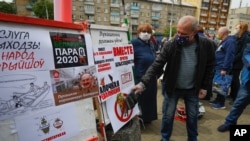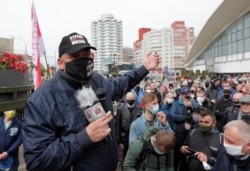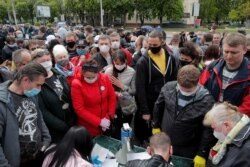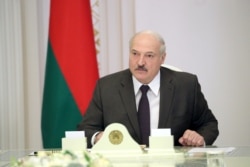Half-a-year ago Alexander Lukashenko, who has ruled Belarus with an iron Soviet-style fist for a quarter of century, looked to be unassailable. But the former collective farm manager, whose aides and supporters like to dub him “father,” is now being widely labeled a “cockroach” — and his opponents are vowing to “squash the pest” come August when he faces a presidential election.
In the past, Lukashenko has managed elections in much the same way as Russian leader Vladimir Putin - disqualify serious opponents from running, fiddle the tallies and silence independent media, according to international election monitors. During the last poll in 2015, many Belarusians observed the upheaval in neighboring Ukraine and took fright, deciding they preferred the leaden, if impoverishing, stability of Lukashenko over unpredictable and possibly ruinous change, say analysts.
But this time, Lukashenko is threatened not by a so-called “color revolution” but with a “slipper uprising,” thanks to popular blogger Sergei Tikhanovsky, who was arrested at a rally last month after an alleged assault on a police officer.
Tikhanovsky was behind the labeling of Lukashenko as a “cockroach,” saying he resembled the insect in a popular children’s poem called “The Mighty Cockroach.” He had taken to driving around Belarus campaigning with a giant slipper tied to the roof of his car — a signal of his intention to flatten Lukashenko.
Charged with public disorder and accused of being a foreign agent after the security services claimed to have unearthed $900,000 in cash during a subsequent search of his home, Tikhanovsky is blocked from running. His 38-year-old wife, Svetlana, has stepped up as a substitute to challenge Lukashenko.
And she has become, on paper, the incumbent Lukashenko’s biggest threat, following the detention on Friday of another challenger, Viktor Babaryko, a 56-year-old former banker, who was arrested for alleged financial crimes, along with his campaign manager, his son. “Babaryko is detained because he was the organizer and leader of illegal activities,” Ivan Tertel, head of the state control committee, told AFP news agency.
Tertel also accused Babaryko of conspiring with Russian “puppeteers.”
The arrests of Tikhanovsky, Babaryko and other Lukashenko critics— which have triggered street protests in the streets of Minsk, the Belarus capital, and earned a rebuke from the European Union — puts Svetlana Tikhanovskaya even more in the spotlight.
Even before Babaryko’s detention, 16% of Belarusians backed her candidacy, according to an unofficial poll run by the news site Tut.by. Police have told the website not to publish any more polls. And the signs are that she is unnerving the idiosyncratic authoritarian leader unaccustomed to challenge. Midweek she told reporters an anonymous caller told her to pull out of the election, warning the Tikhanovskys’ ten-year-old son and four-year-old daughter could be taken away from them if she refused.
She says she had considered backing down, but has decided to continue, determined to be a champion for Belarusians, many of whom “don’t know that in Europe you can say what you think without fear.” She added, “I’ve never wanted to be a politician, let alone the president. This is just how things have turned out.”
Svetlana Tikhanovskaya has become an unlikely revolutionary figurehead. She describes herself as just a stay-at-home mother and wife. One of the couple’s children has special needs. But the enthusiasm for change is clear. Towns across the landlocked country of nine million have seen protests and crowds appear to support her candidacy and the campaigns of other opposition candidates. She acknowledges “people at these rallies are supporting Sergei, not me.”
Her husband, who has been compared to Alexei Navalny, the blogger turned opposition leader in neighboring Russia, says he is playing “the main role in my wife Svetlana Tikhanovskaya's election campaign; her role will be only a nominal one.” He has in the campaign team other popular bloggers.
Despite last week’s arrests people in Minsk are lining up again to sign the nomination papers of candidates opposing Lukashenko, according to Belarusian journalist Hanna Liubakova. She tweeted Sunday: “3 leading #Lukashenko’s rivals collected more than 730,000 signatures in less than a month. If you count 3 other alternative candidates, it is more than a million. This campaign has already shown that the level of activism and political engagement is incredibly high.”
Candidates have to gather at least 100,000 signatures to be qualified to stand.
The opposition to Lukashenko is being fueled by an increasingly parlous economic situation, a coronavirus crisis, which the president downplayed from the start and cheerily told Belarusians to take saunas and drink vodka to avoid falling ill, and just a weariness with his rule and stagnation, analysts say. Younger Belarusians seem impervious to Lukashenko’s warnings of chaos, if he’s not reelected to his sixth term. And they are immune seemingly to the Soviet-like stability their elders favor.
Lukashenko is not being helped in his political struggle by neighboring Russia. His relationship with Vladimir Putin has long been a fitful one with the two falling out frequently and then circling back for convenience sake. A senior Russian diplomat based in Minsk described to VOA once the “shouting match” he overheard during a phone conversation between the pair.
Analysts say Putin’s major objective towards Belarus is to ensure — much as his goal is with Ukraine — that it doesn’t end up as a pro-Western enclave on Russia’s borders, say analysts. The Belarusian leader has long played the West against Russia and vice versa. He observed a neutral stance over Russia's 2014 annexation of the Crimean Peninsula in 2014 and hosted peace talks in Minsk to try to find a solution to the war in eastern Ukraine.
But he has relied on Russia financially for help — and that has been less forthcoming with subsidies and oil supplies in recent months, punishment, analysts and diplomats say, for Lukashenko’s resistance to Putin’s efforts to draw Minsk deeper into the Russian orbit.
Few analysts predict that anyone other than Lukashenko will be allowed to win the Aug. 9 poll — and they warn that Belarus could quickly be plunged into a Maidan-like uprising that saw the 2014 ouster of Viktor Yanukovych in Ukraine.
Protests are spreading across Belarus as opposition to Lukashenko grows, local media and human rights organizations report. On Friday, more than 10 cities across the former Soviet republic saw protests with dozens of activists arrested by the security forces. The independent human rights group Viasna says least 120 people were detained.
Lukashenko appears to be preparing for the likelihood of a violent reaction to his seemingly inevitable electoral win, claiming on Friday that by arresting Babaryko and dozens of political activists he had foiled a Ukraine-style revolutionary plot hatched by foreign conspirators from “both the West and from the East,” who are intent on fomenting unrest in Belarus.
Former aide Alexander Feduta, now a political analyst, has warned that Lukashenko is ready to use force to stay in power. The arrests are an indication of that, he says.







